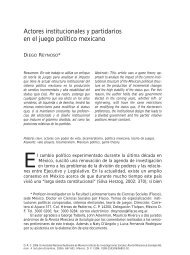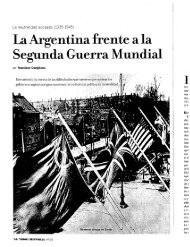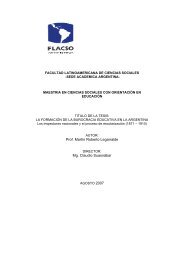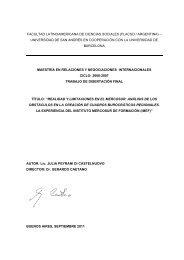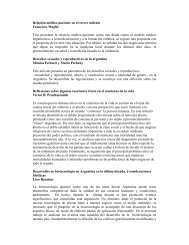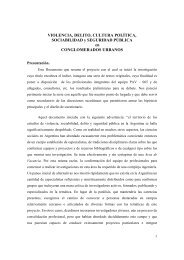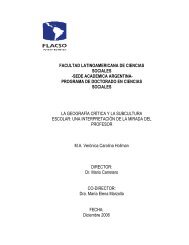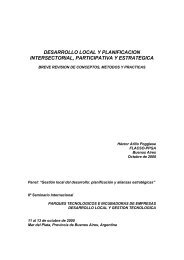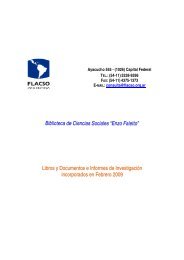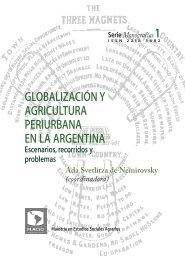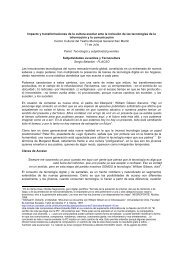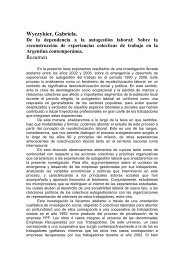Mercedes Botto Andrea Carla Bianculli - Flacso
Mercedes Botto Andrea Carla Bianculli - Flacso
Mercedes Botto Andrea Carla Bianculli - Flacso
Create successful ePaper yourself
Turn your PDF publications into a flip-book with our unique Google optimized e-Paper software.
extremely technical research, where the negotiators would define their needs and requirements<br />
while academics would concentrate on the statistical data collection. Nevertheless, unlike the<br />
negotiation of the PICE, those in charge of the elaboration of this report did not receive the<br />
necessary social and political support in order to use the data and information that had been<br />
collected.<br />
Finally, we come to the last of the preconditions that can determine the influence of academic<br />
knowledge on the decision-making process: the political will of the decision makers and their<br />
determination to make use of it. There are very sharp contrasts in this respect between both<br />
episodes. In terms of the CGP, the final list elaborated by the appointed researcher was the unique<br />
element or input the Argentine government took to the negotiating table with Brazil. Sectoral<br />
accords would thus advance only in those industries or sectors where there was reliable information<br />
regarding the benefits that integration would bring about, while those sectors where there was no<br />
empirical evidence and consensus building among the stakeholders did not work, were removed<br />
from the final list. During the final negotiation of the CET, the policy recommendations put<br />
forward through the empirical analyses that had been previously developed were not taken to the<br />
discussions with Brazil. Certainly, this turned out to be a rather atypical negotiation, whose results<br />
were highly determined by the timing and pressure exercised by the main commercial partner –<br />
Brazil – given the lack of definition and of interagency coordination Argentina showed. Out of the<br />
three proposals that were specifically commissioned at the national level, the only one that would<br />
finally exercise some influence in the bilateral negotiations was the joint document prepared by the<br />
chambers of chemical and petrochemical industries of Argentina and Brazil, and which would be<br />
then presented to both national governments, and to the regional authorities as well. Finally,<br />
Mercosur authorities would accept its inclusion in the final agreement, with only some slight<br />
modifications.<br />
Having compared both episodes in terms of the production of academic knowledge, its articulation<br />
within the decision-making process, and its use, we will now delve into the factors that promoted<br />
the production of knowledge in both cases, its articulation and use in the case of the CGP, and the<br />
CET proposal by the chemical and petrochemical sector.<br />
In terms of the academic production, the existence of new problematic issues or questions<br />
regarding which the decision maker has no experience while the available information fails to<br />
present adequate answers to these new challenges, constitute an incentive for the participation and<br />
appointment of the academia. This was precisely the case in terms of the paradigmatic change<br />
within the development model experienced in Argentina since the mid-1980s. Later on, the CET<br />
negotiations would make this knowledge demand even more pressing in the face of the lack of<br />
interministerial coordination and the different approaches to integration promoted by the Ministries<br />
of Economy and Foreign Affairs. The main question under debate had to do with the construction<br />
of a customs union with Brazil. In turn, this knowledge demand would extend to business actors,<br />
such as the chemical and petrochemical sector, which assessed the need for elaborating its own<br />
sectoral proposal.<br />
36


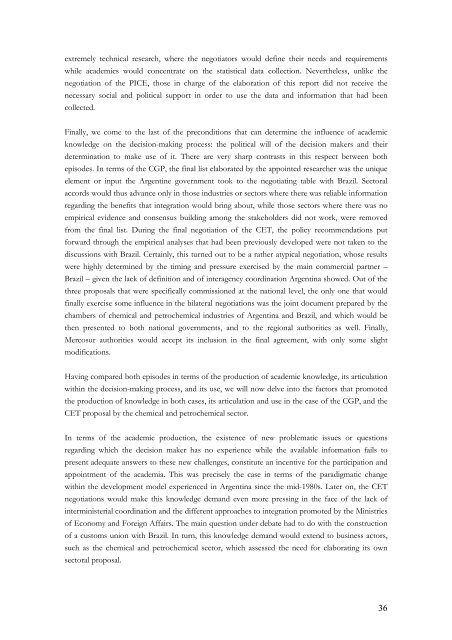
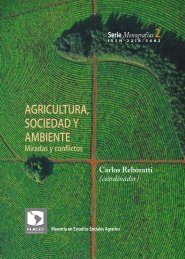
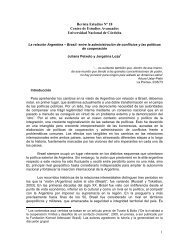
![[P] Disertacion.Melisa.Galvano.pdf - Flacso](https://img.yumpu.com/14596629/1/184x260/p-disertacionmelisagalvanopdf-flacso.jpg?quality=85)
